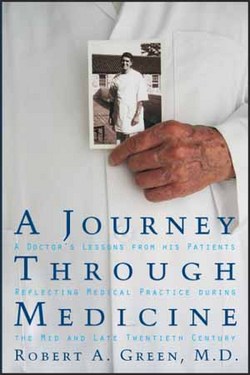'A journey through medicine': Lessons a doctor learned from his patients

"In his recent memoir of vignettes, Dr. Robert A. Green reflects on the many patients who impacted his life during his tenure in the medical field. Dr. Green served at the University of Michigan for more than 40 years"--Stephanie Fenton
To start, you must allow me to self-disclose as someone who has a severe mistrust of physicians and of modern-day medicine in general. When an ailment settles upon me, my first course of action is always to do nothing—if something must be done, I will try a home remedy or search online for a treatment option. But, I will never visit a doctor. My extremeness in this scenario is a large part of what motivated me to agree to read and review Dr. Robert A. Green’s “A journey through medicine: A doctor’s lessons from his patients reflecting medical practice during the mid and late twentieth century.” I liked the idea of reading about a physician humbled, one admitting that, as my father likes to say, “medicine is a practice, they haven’t got all of the answers yet!”
A departure from my normal menu of classics, classics and more classics, “A journey through medicine” was a breath of fresh air. I enjoyed the vignette arrangement, which allowed me to pick-up and put-down this book easily at my leisure. I found myself learning while I read, and not the normal points from my novels (such as gads of information about the French Revolution or about turn-of-the-century etiquette) but about topics that—had I not read this book—I probably never would have learned anything about. In fact, midway into the text, I posted as my personal status update on Facebook: “I think that the doctor book I am reading just might be making me smarter. I think I could now possibly diagnose miliary tuberculosis”. While I was only joking (please don’t come to me, if you are actually sick!), the memoir definitely had a didactic quality to it.
Some of the anecdotes were a bit too technical for my non-medical mind, but many others could have been easily understood by the layest of laypeople. My favorite story is entitled “Panic” and can be found on page 88. Early in his career as a pulmonary specialist, Dr. Green was working at an Indian Hospital (servicing a population that mid-century was strongly affected by tuberculosis) in Oklahoma. Since only two other doctors besides himself were available at this facility, he had to be prepared to handle any case that came into the hospital. One day a young white farmer called him, asking for help since his usual doctor could not be located and his wife was going into labor with their first child. Dr. Green allowed the couple admission into the birthing suite at the Indian Hospital. When the baby was born it had a “deathly white pallor”. Panicked, Dr. Green prepared to deal with the seriously dangerous condition of asphyxia pallida—a severe lack of oxygen caused by a pre-birth illness which usually means that the infant may become seriously ill or die. After being bombarded by a fleet of racing thoughts, in attempts to identify the best course of action, Dr. Green “finally realized that the ‘problem’ with this child was: it was white! Up to now (he) had been delivering only dusky, healthy, reddish dark-skinned Indian babies, and the contrast with this blond Caucasian infant was startling!” That made me laugh audibly during my reading session, which normally has a morgue-like quiet to it!
Dr. Green’s admission of error and willingness to try new approaches coupled with his genuine concern for patients (sometimes even years after having treated them) helped me to see that perhaps not all medical professionals deserve my mistrust. While having read this memoir probably won’t send me running to a doctor next time I am bed-ridden with some ailment or another, it will help me to consider the alternative just a little bit longer before readjusting my hot water bottle, curling up in a ball and trying to sleep it off.
Melissa LR Handa is the founder and organizer for the Ann Arbor Classics Book Group and the Lead Books Contributor for AnnArbor.com. If you would like more information or to join the group, please feel free to send an email her way.

